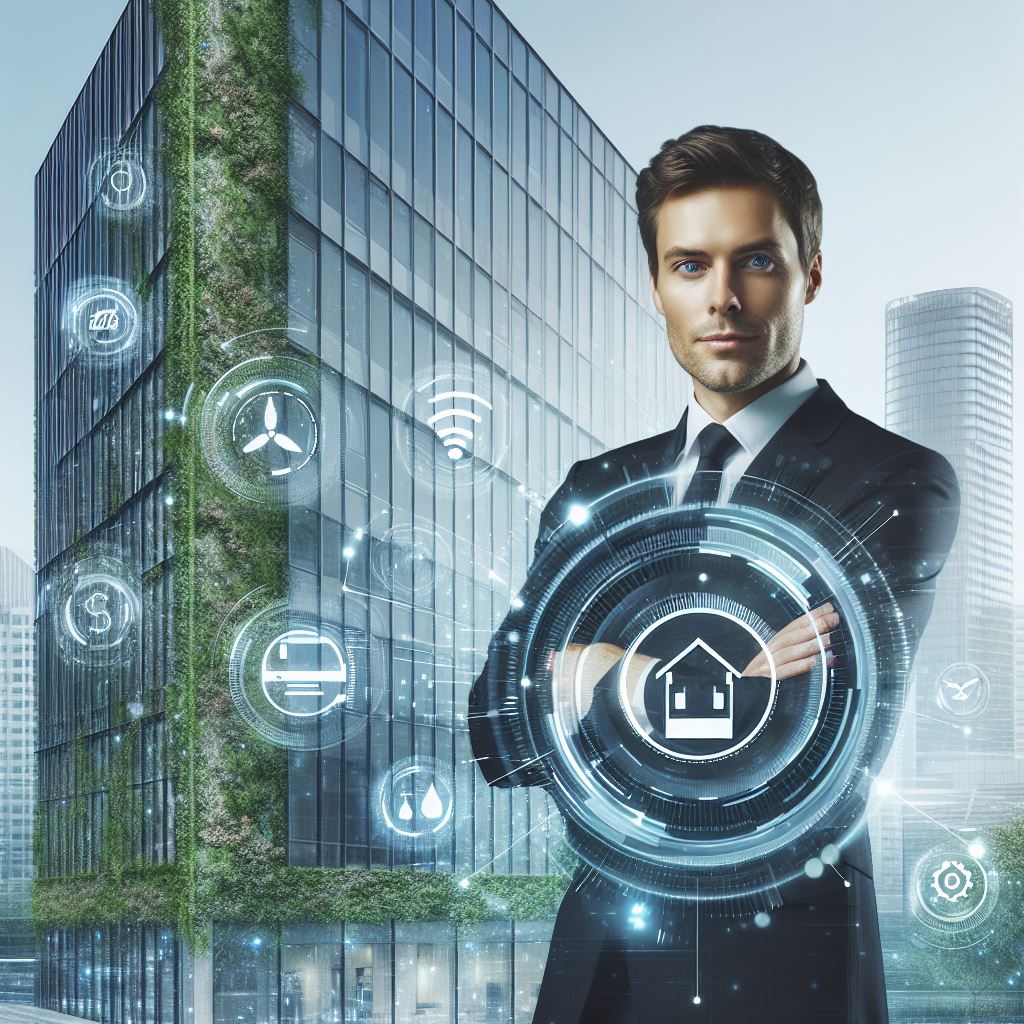Introduction
In this post, we will explore sustainable practices in property management tech and its significance in today’s world.
Sustainable practices in property management tech refer to the implementation of environmentally friendly and energy-efficient solutions in managing properties.
It is crucial to incorporate sustainability in property management as it not only reduces environmental impact but also results in cost savings and increased property value.
Sustainable practices can encompass various aspects, including energy management, water conservation, waste reduction, and smart technology integration.
In the following sections, we will delve deeper into each of these key areas.
Firstly, energy management involves optimizing energy usage through techniques like retrofitting buildings with energy-efficient lighting and appliances, utilizing renewable energy sources, and implementing smart energy management systems.
Secondly, water conservation plays a significant role in sustainable property management.
This can be achieved by installing water-efficient fixtures, implementing rainwater harvesting systems, and utilizing landscaping techniques that minimize water consumption.
Next, waste reduction strategies focus on minimizing waste generation, recycling materials, and responsibly disposing of waste.
Property managers can implement waste management programs, educate tenants about recycling practices, and work with local recycling facilities.
Last but not least, smart technology integration involves leveraging advanced technologies to enhance property management efficiency and sustainability.
This can include implementing smart thermostats, automated lighting systems, and building management platforms that provide real-time data for analysis and optimization.
By incorporating these sustainable practices in property management tech, we can create more energy-efficient, environmentally friendly, and economically beneficial properties.
Energy Efficiency and Automation
Integrating sustainable practices in property management tech is essential for reducing the environmental impact of buildings.
Energy efficiency and automation are key aspects of sustainable energy practices that can significantly contribute to creating more environmentally friendly properties.
Overview of sustainable energy practices in property management tech
In recent years, the property management industry has increasingly embraced technology solutions to promote sustainability.
Sustainable energy practices in property management tech involve utilizing energy-efficient technologies and implementing automation systems to optimize energy usage.
These practices aim to minimize the environmental impact of buildings and enhance sustainability.
Importance of energy efficiency in reducing environmental impact
Energy efficiency plays a crucial role in reducing the environmental impact of buildings.
By implementing energy-efficient technologies, property managers can significantly decrease energy consumption, resulting in lower greenhouse gas emissions and reduced reliance on fossil fuels.
This ultimately aids in mitigating climate change and preserving natural resources.
Examples of energy-efficient technologies for property management
Implementing energy-efficient technologies is essential for achieving sustainability in property management.
Two notable examples of such technologies are smart thermostats and HVAC systems, as well as LED lighting and motion sensors.
Smart thermostats and HVAC systems
Smart thermostats enable precise temperature control and allow property owners to adjust temperature settings remotely.
These devices use advanced sensors and algorithms to optimize heating and cooling based on occupancy and preferences.
By minimizing energy wastage, smart thermostats contribute to significant energy savings.
LED lighting and motion sensors
LED lighting is highly energy-efficient compared to traditional incandescent bulbs.
They consume less energy and have a longer lifespan, reducing maintenance and replacement costs.
Pairing LED lighting with motion sensors ensures that lights are only active when needed, preventing unnecessary energy consumption.
Benefits of energy automation systems in property management
Energy automation systems further enhance the efficiency and sustainability of property management by enabling real-time monitoring and optimization of energy usage.
Real-time monitoring and optimization of energy usage
Energy automation systems provide property managers with accurate, up-to-date data on energy consumption.
By monitoring energy usage in real-time, they can identify inefficient patterns, detect anomalies, and make informed decisions to optimize energy efficiency.
This leads to better resource allocation and reduced energy waste.
Cost savings and reduced carbon footprint
Implementing energy automation systems can result in significant cost savings for property owners.
By optimizing energy usage, reducing energy waste, and identifying potential operational improvements, property managers can effectively lower energy bills and increase financial efficiency.
Moreover, these energy-saving measures contribute to a reduced carbon footprint, aligning with sustainability goals.
In fact, energy efficiency and automation play vital roles in sustainable practices within property management tech.
Embracing energy-efficient technologies and implementing automation systems not only benefits the environment by reducing energy consumption and carbon emissions but also offers economic advantages through cost savings.
By prioritizing sustainable practices, property managers can contribute to a greener future while still meeting their operational needs.
Read: Smart Contracting in Property Transactions
Waste Management and Recycling
Sustainable waste practices in property management tech
Property management technology has made significant strides in promoting sustainable waste practices.
By leveraging innovative solutions, property managers can minimize environmental impact while optimizing waste management processes.
Importance of proper waste management and recycling
Proper waste management and recycling are vital for sustainable property management.
They help reduce landfill waste, conserve resources, and minimize pollution, contributing to a healthier and greener environment.
Technological solutions for effective waste management
- Smart trash bins and waste tracking systems: Smart bins equipped with sensors monitor waste levels, enabling efficient waste collection routes and preventing overflows.
Waste tracking systems provide real-time data and insights for better waste management decision-making. - Data analytics for waste reduction strategies: By using data analytics, property managers can identify waste patterns and implement targeted strategies to reduce waste generation.
This data-driven approach promotes optimized waste management practices and fosters sustainability.
Benefits of implementing sustainable waste management practices
- Reduced landfill waste and pollutio: Proper waste management practices divert materials from landfills, reducing the volume of waste and associated pollution.
This helps preserve natural resources and prevents the release of harmful greenhouse gases. - Potential cost savings through recycling and waste diversion: Efficient waste management techniques, such as recycling, can result in cost savings.
Materials that are recycled can be repurposed, reducing procurement costs and conserving resources, leading to a more economically sustainable property management approach.
In short, sustainable waste management practices play a crucial role in property management tech.
By leveraging technological solutions like smart trash bins and data analytics, property managers can minimize waste generation, conserve resources, and reduce environmental impact.
The implementation of such practices not only benefits the environment but also provides potential cost savings.
It is essential for property managers to embrace and prioritize these sustainable practices for a greener and more efficient future.
Read: Data Analytics: A Game-Changer in Property Management
Water Conservation and Monitoring
Sustainable water practices in property management tech
In the field of property management technology, there is a growing focus on implementing sustainable water practices.
These practices aim to conserve water resources and ensure efficient usage in various properties.
Significance of water conservation in sustainable property management
Water conservation plays a critical role in sustainable property management.
By reducing water consumption, property owners can contribute to preserving water resources for future generations and mitigate the impacts of water scarcity.
Technologies for efficient water usage and monitoring
- Water-efficient fixtures and appliances: One effective way to conserve water in property management is by installing water-efficient fixtures and appliances.
These include low-flow toilets, faucets, and showerheads that are designed to minimize water wastage without compromising functionality. - Smart irrigation systems with weather monitoring: Smart irrigation systems equipped with weather monitoring technology can optimize water usage by adjusting irrigation schedules based on real-time weather conditions.
These systems ensure that plants receive the right amount of water without unnecessary wastage.
Advantages of implementing water conservation measures
- Reduced water consumption and utility costs: Implementing water conservation measures can significantly reduce water consumption and, consequently, utility costs.
Property owners can save on bills while also contributing to sustainable water usage. - Enhanced environmental stewardship and sustainability: By prioritizing water conservation, property owners demonstrate their commitment to environmental stewardship and sustainability.
This proactive approach helps protect local ecosystems and supports the overall health of the planet.
In general, sustainable water practices in property management tech are essential for conserving water resources and promoting efficient usage.
By incorporating water-efficient fixtures, smart irrigation systems, and other monitoring technologies, property owners can reduce consumption, lower utility costs, and contribute to environmental stewardship.
Read: The Rise of Online Commercial Real Estate

Data-driven Analytics and Decision Making
Data-driven analytics have transformed property management by providing valuable insights into sustainable practices.
By leveraging technological solutions, property managers can efficiently track real-time data and make data-driven decisions that promote sustainability.
Importance of data-driven approaches in sustainable property management
Data-driven approaches have become increasingly important in sustainable property management.
By analyzing data related to energy consumption, resource usage, and operational efficiency, property managers can gain critical insights into their building’s sustainability performance.
For instance, data analytics can reveal patterns of energy usage and identify areas where energy conservation measures can be implemented.
By understanding these patterns, property managers can optimize energy usage, reduce carbon footprint, and lower utility costs.
Data-driven approaches also enable property managers to monitor and track the performance of sustainable initiatives.
Analytics provide quantitative metrics on the effectiveness of sustainability measures, allowing property managers to make data-driven decisions on which initiatives to prioritize or modify.
Overview of property management tech solutions for data analytics
Building management systems with real-time data tracking
Building management systems (BMS) equipped with real-time data tracking capabilities play a pivotal role in sustainable property management.
These systems collect and analyze data from various sources such as occupancy sensors, smart meters, and IoT devices.
Real-time data tracking allows property managers to monitor energy usage, water consumption, and indoor air quality.
With this information at their fingertips, property managers can identify inefficiencies and promptly address issues to improve sustainability performance.
Furthermore, BMS often provide automated alerts and notifications, enabling property managers to take immediate actions when abnormal energy usage or equipment malfunctions are detected.
This proactive approach prevents energy waste and enhances sustainability efforts.
Predictive maintenance for energy and resource efficiency
Predictive maintenance uses data analytics and machine learning to identify equipment malfunctions or degradation before they occur.
By analyzing historical data and monitoring real-time sensor data, property managers can predict when maintenance or repairs are necessary.
This proactive approach minimizes equipment downtime, improves energy efficiency, and reduces resource waste.
By detecting issues early on, property managers can schedule maintenance activities during periods of low occupancy, minimizing disruptions to tenants and optimizing operational efficiency.
Benefits of leveraging data analytics for sustainability
Precise resource allocation and optimization
Data-driven analytics enable property managers to allocate resources precisely where they are needed, reducing waste and unnecessary consumption.
By analyzing energy consumption patterns and occupancy data, property managers can optimize lighting, heating, and cooling systems to match actual demand.
The ability to optimize resource allocation not only reduces environmental impacts but also decreases operational costs.
Energy-efficient buildings with optimal resource allocation often experience decreased utility bills, creating cost savings that can be reinvested in sustainability efforts.
Improved operational efficiency and tenant satisfaction
Data analytics provide property managers with insights into operational inefficiencies and bottlenecks.
By identifying areas of improvement, property managers can streamline workflows, reduce energy waste, and enhance overall operational efficiency.
Improved operational efficiency translates into a better experience for tenants.
For example, data-driven analytics can help property managers anticipate maintenance needs, reducing response times to tenant requests and enhancing overall tenant satisfaction.
In review, data-driven analytics and decision making have revolutionized sustainable property management.
By leveraging real-time data tracking, predictive maintenance, and other technological solutions, property managers can make informed decisions that optimize resource usage, improve operational efficiency, and drive tenant satisfaction.
These data-driven approaches are essential for achieving long-term sustainability goals and reducing the environmental impact of property management.
Read: Mobile Apps: Changing the Property Management Game
Conclusion
Throughout this blog post, we have explored the importance of sustainable practices in property management tech.
We discussed the use of energy-efficient systems, smart technology integration, and data analytics for resource optimization.
It is crucial to understand that sustainable practices not only benefit the environment but also lead to cost savings, improved tenant satisfaction, and better asset performance.
As property managers, it is our responsibility to embrace innovative technologies that promote sustainability.
By adopting energy-efficient systems and smart technologies, we can reduce our carbon footprint and contribute to a greener future.
The advancements in property management tech have provided us with unprecedented opportunities to adopt sustainable practices.
By integrating energy-efficient systems and smart technologies, we can optimize resource usage, reduce costs, and create a more sustainable built environment.
Embracing these innovations will not only benefit our properties and tenants but also contribute to a greener future for generations to come.
Let’s take the initiative to explore and adopt sustainable technologies in property management.
Together, we can make a significant difference in building a sustainable and environmentally conscious society.




